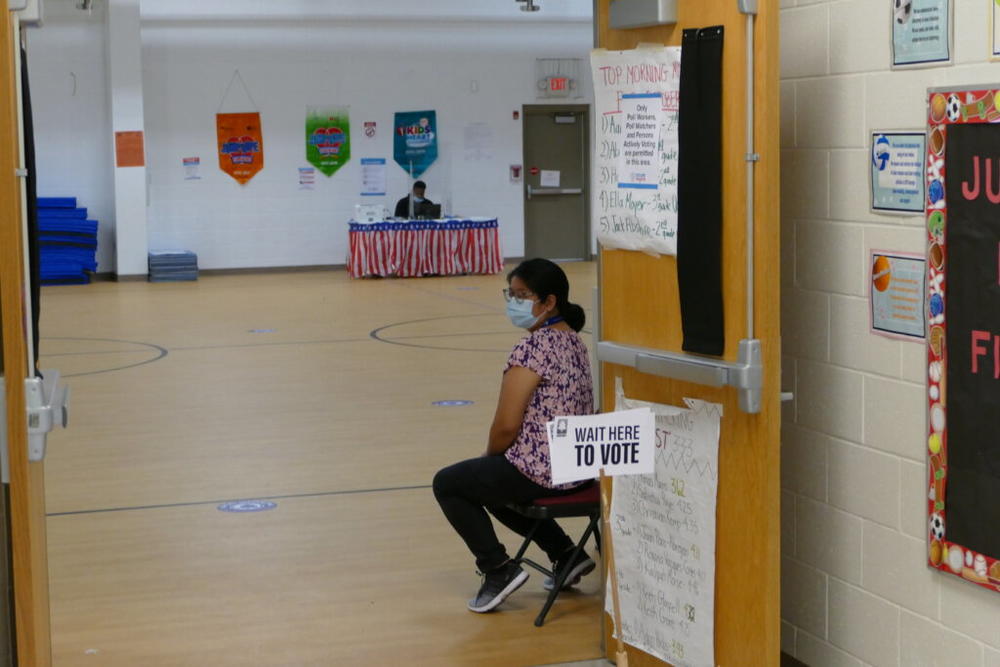
Caption
The turnout has been low since the Oct. 12 start of early voting for municipal elections across Georgia, which is helping election officials ease into a slew of rules.
Credit: John McCosh/Georgia Recorder file photo

The turnout has been low since the Oct. 12 start of early voting for municipal elections across Georgia, which is helping election officials ease into a slew of rules.
When Marcia Killingsworth noticed some troubling election plans for the Edison citywide election she checked in with the Georgia Secretary of State’s office after feeling local officials were dragging their feet.
Killingworth lives in Calhoun County, where the Edison city of about 1,300 residents in southwest Georgia is one of the 111 local election contests that began early voting last week, providing the first large-scale trial run for the state’s controversial new election law.
County election officials are adjusting to new rules that limit absentee ballot mailing windows, restrict absentee drop boxes, require new identification for voting by mail, and other new restrictions that have sparked a national backlash. In Georgia’s municipal elections, highlighted by the race for Atlanta mayor, turnout was slow last week; 25,688 people had voted by Thursday night and only 500 absentee ballots had been received out of 23,674 requests, according to the secretary of state’s office.
With slow turnout, poll workers across Georgia seemed to handle the new rules without trouble.
But Killingsworth needed reassurance that Calhoun election officials are securing the absentee drop box at the old Edison City Hall according to the new rule that says ballots must be deposited indoors during regular business hours. She said she also had to inquire repeatedly about a city council member being considered as a poll worker for colleagues running for reelection. That coziness violates long-standing election laws. City leaders eventually removed the elected official’s name from a list of potential poll workers.

The former Edison City Hall is the voting site for the municipal elections in the small southwest Georgia community.
Killingsworth said she sympathizes with poll workers and election staff who will face a raft of new rules when more voters make their way to the polls and ask for help navigating the new system.
“I would say to citizens who have questions (about election procedures) that they should contact their local authorities,” she said. “I would suggest asking for answers in writing because voting is so complicated right now with all the changes.
“Verbal response is fine and it’s informative, but it’s not something you want to take a chance on misremembering,” Killingsworth said. “And then, if your local officials are unresponsive, call the secretary of state’s office.”
Election officials so far have avoided the significant problems predicted by Democrats and other progressive voting rights organizations with the new regulations as low voter turnout is giving more time to work out any kinks that crop up.
When Republicans ushered through Senate Bill 202 in March, a bitter battle had long been waged between what the GOP hailed as restoring confidence in Georgia’s elections following the defeat of President Donald Trump versus what the Democrats dubbed voter suppression tactics Jim Crow 2.0.
President Joe Biden ripped Georgia’s new election law this summer and U.S. Senate Democrats are pressing for federal legislation that would overturn changes state lawmakers made in the 2021 legislative session.
Changes include the requirement of an ID such as a driver’s license to vote absentee, an approach critics feared would further disenfranchise minorities. Republican Secretary of State Brad Raffenspeger and GOP lawmakers say the ID requirement further improves voter security by replacing the more subjective signature match requirement. In the 2020 presidential election recounts, county poll workers compared signatures on envelopes with the ones on file to audit absentee ballots.
In some instances, the new standards have caused confusion, such as handling of absentee cure forms when family members forgot to sign the oath, said Deidre Holden, Paulding County election supervisor and immediate past-president of the Georgia Association of Voter Registration and Election Officials.
“We have been concerned with some of the requirements,” Holden said. “If there is a requirement that is not clear for us, we have been sending out concerns and questions to the Secretary of State Elections Division for guidance.”
“If they do not return the affidavit, we have to reject the ballot,” Holden added. “The authority to open the absentee envelope when the voter is required to provide a copy of their identification when they do not have the (drivers license number) or last 4 of the SSN. I think we have gotten a solid solution concerning this as of (Wednesday).”
In Cherokee County, when residents call in requesting absentee applications, elections staff are notifying voters about the new deadlines, Election Director Anne Dover said.
The new window for requests has shrunk to 78 days before Election Day and postmarked no more than 11 days before Election Day. In the past, voters could request absentee ballots up to 180 days before a vote and mail it in up until the Friday before the vote.
And getting the word out about the rules for drop boxes has been at the top of the mind of Cherokee election staff, the county’s Election Director Anne Dover said.
While the new voting law requires absentee drop boxes to be available in each of Georgia’s 159 counties, controversy swirled around limiting the number each county can provide and requiring them to be located and monitored inside the county’s election office or early voting locations. The new drop box limitations drastically reduce locations to hand-deliver absentee ballots in metro Atlanta’s most populated counties.
“Our main concern was communicating with voters and helping them to understand that drop boxes have been moved inside and are not accessible to voters outside of advance/early voting hours,” Dover said. “Cherokee County has purchased signs advising voters of drop box locations. Drop box locations and times have been posted on our website.”
New ID requirements such as a system of driver’s licenses requirements instead of signature matches for absentee ballots are among the changes voting rights advocates heavily criticized. This was seen as further disenfranchisement of marginalized people.
Democratic groups and voting rights advocates argue that several provisions will result in fewer voters. Among them is anyone showing up at the wrong polling place on Election Day will only be allowed to cast a provisional ballot if they arrive after 5 p.m., which could have resulted in thousands of votes getting rejected in last year’s general election.
The effects of the new provisional rule will not be evident until Election Day on Nov. 2, depending on turnout. And the lack of voters lining up at precincts so far has made the new restrictions against volunteers giving out beverages and snacks in lines a moot point.
Due to the low turnout, Dover was able to reduce the number of poll workers until more voters showed up for early voting.
“We typically see a smaller turnout with municipal elections,” Dover said. “ It has become increasingly difficult to predict what voters are going to do.”
In Paulding, about 50 voters came out and Holden chalked that up to few races on the ballot.
Across Georgia, the current pace of turnout is significantly lower compared to last year’s early voting for a general election, which had 2.3 million mail-in and in-person voters. The November 2020 ballot was dominated by the presidential election, two U.S. Senate seats and more than 200 state lawmakers.
This story comes to GPB through a reporting partnership with Georgia Recorder.